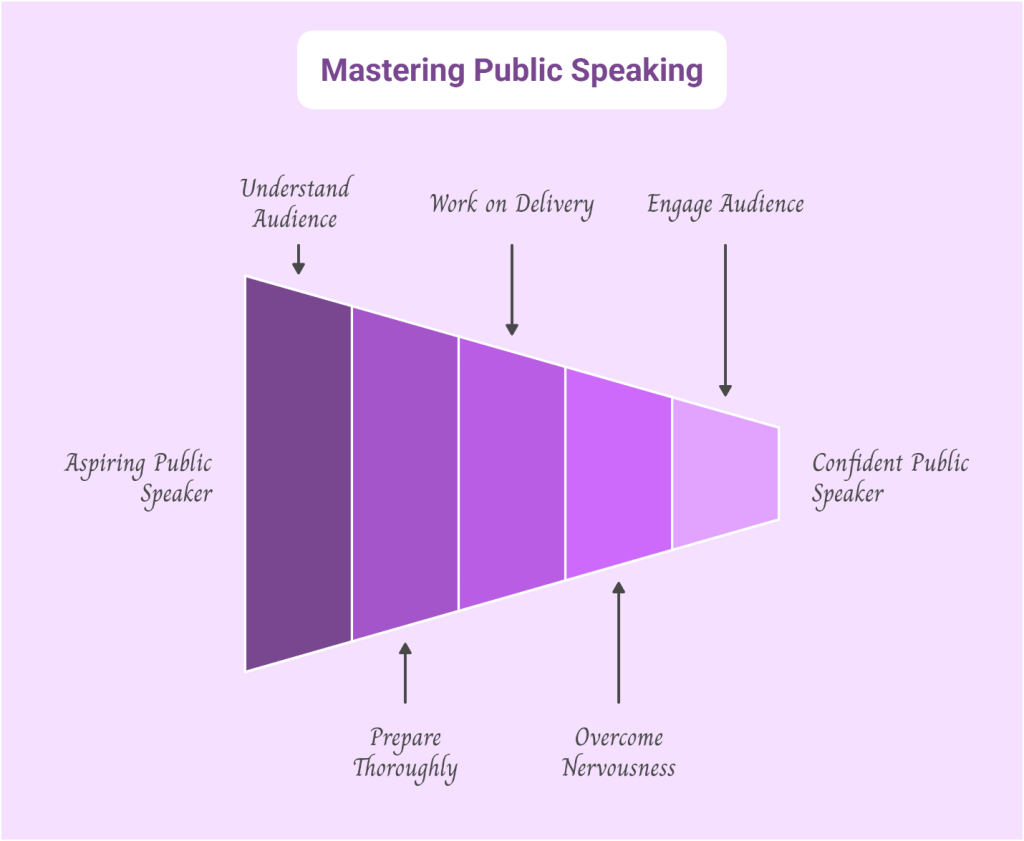Public speaking is an essential skill, whether you’re delivering a presentation, giving a speech, or pitching an idea. While it may seem intimidating, it’s a skill that can be developed with practice and the right strategies. Here’s a comprehensive guide to help you master the art of public speaking.

1. Understand Your Audience
The first step to effective public speaking is understanding who you’re speaking to. Tailor your message to their needs, interests, and level of understanding.
Tips:
Research your audience’s demographics, interests, and expectations.
Use relatable examples and stories that resonate with them.
Keep your language and tone appropriate for the audience.
2. Prepare Thoroughly
Preparation builds confidence. The more you know your material, the less nervous you’ll feel.
Tips:
Outline your main points and structure your speech logically.
Create a strong opening to grab attention and a memorable closing to leave an impact.
Practice your speech multiple times to refine your delivery.
3. Work on Your Delivery
How you say something is as important as what you say. Your tone, pace, and body language all play a role in engaging your audience.
Tips:
Use a conversational tone to make your speech more relatable.
Vary your pitch and pace to maintain interest.
Make eye contact with different sections of the audience.
Use gestures to emphasize points, but avoid overdoing them.
4. Overcome Nervousness
It’s natural to feel nervous before speaking. The key is to manage it effectively.
Tips:
Practice deep breathing to calm your nerves.
Focus on the message, not on yourself.
Visualize a successful speech.
Start with smaller, supportive audiences to build confidence.
5. Engage Your Audience
A good speech is a two-way interaction. Keep your audience engaged to ensure they’re actively listening.
Tips:
Ask rhetorical questions or invite audience participation.
Share anecdotes, statistics, or visuals to make your speech more compelling.
Pause occasionally to let key points sink in.
6. Master Non-Verbal Communication
Your body language can enhance or detract from your message.
Tips:
Maintain good posture to exude confidence.
Use open gestures to connect with your audience.
Avoid fidgeting or pacing excessively.
7. Handle Mistakes Gracefully
Even experienced speakers make mistakes. What matters is how you handle them.
Tips:
Pause, take a deep breath, and continue.
If you forget something, reframe or move to the next point.
Use humour or self-awareness to diffuse awkward moments.
8. Seek Feedback and Practice Regularly
Continuous improvement comes from self-evaluation and feedback.
Tips:
Record yourself to evaluate your tone, pace, and body language.
Join groups like Toastmasters to practice in a supportive environment.
Ask trusted friends or mentors for constructive feedback.
9. Leverage Visual Aids
Visual aids can enhance your speech, but they should support your message rather than distract from it.
Tips:
Use slides, charts, or props sparingly.
Ensure visuals are clear, concise, and relevant.
Avoid reading directly from your slides.
10. Stay Authentic
Authenticity makes you relatable and trustworthy.
Tips:
Speak from the heart and be yourself.
Share personal stories or experiences where appropriate.
Don’t try to emulate someone else—find your unique speaking style.
Conclusion
Public speaking is a skill that improves with practice, patience, and perseverance. By preparing thoroughly, engaging your audience, and staying authentic, you can turn even the most nerve-wracking speaking engagements into opportunities for connection and impact.
Pro Tip: Remember, every great speaker was once a beginner. Embrace the learning process, and you’ll see significant growth over time!

